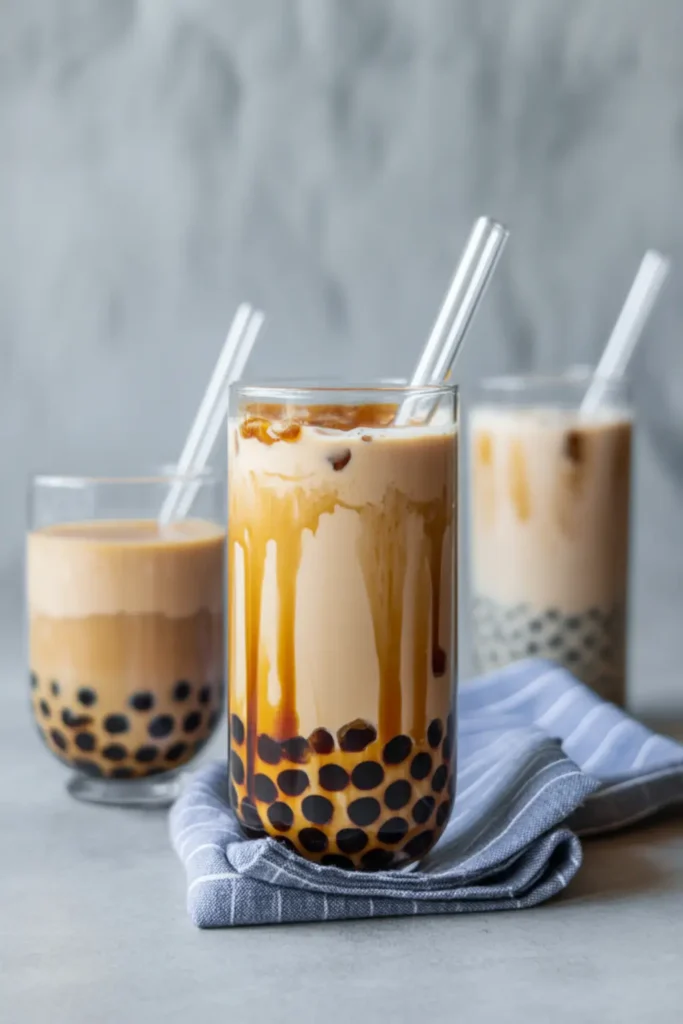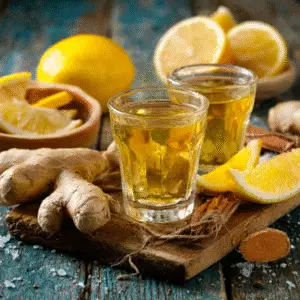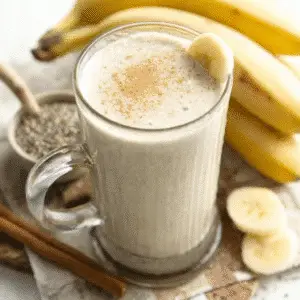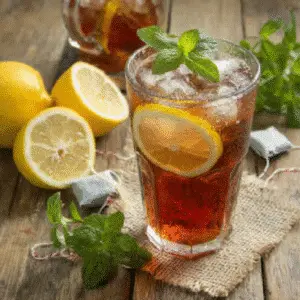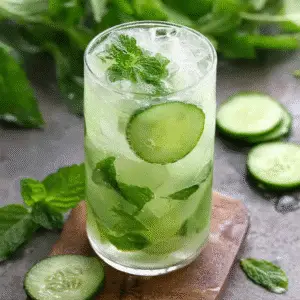🖋️ Written by Olivia
There’s something joyful about the sound of ice clinking in a tall cup, a wide straw diving in, and that first chewy pop of a tapioca pearl. I remember walking into a tiny tea shop downtown with my best friend years ago. We ordered bubble pearl milk tea, unsure of what we’d get. One sip in, and we couldn’t stop smiling. Creamy, cool, and slightly sweet—it wasn’t just a drink. It was an experience.
Today, bubble pearl milk tea is more than a trend. It’s a global sensation served in countless flavors and textures. But what makes it so addictive? Is it the silky milk tea base? The caramel-like pearls? Or just the feeling of holding that iconic cup?
In this post, I’ll show you what makes this drink unique, how to recreate it at home, and why so many people fall in love with boba. From its ingredients to how to drink it like a pro, we’re covering everything. And if you’re a fan of creamy iced teas, you might also want to try our popular Taro Milk Tea recipe—a pastel purple cousin of bubble tea with equally rich flavor.
Grab your cup, and let’s get into the magic behind every chewy sip.
Table of Contents
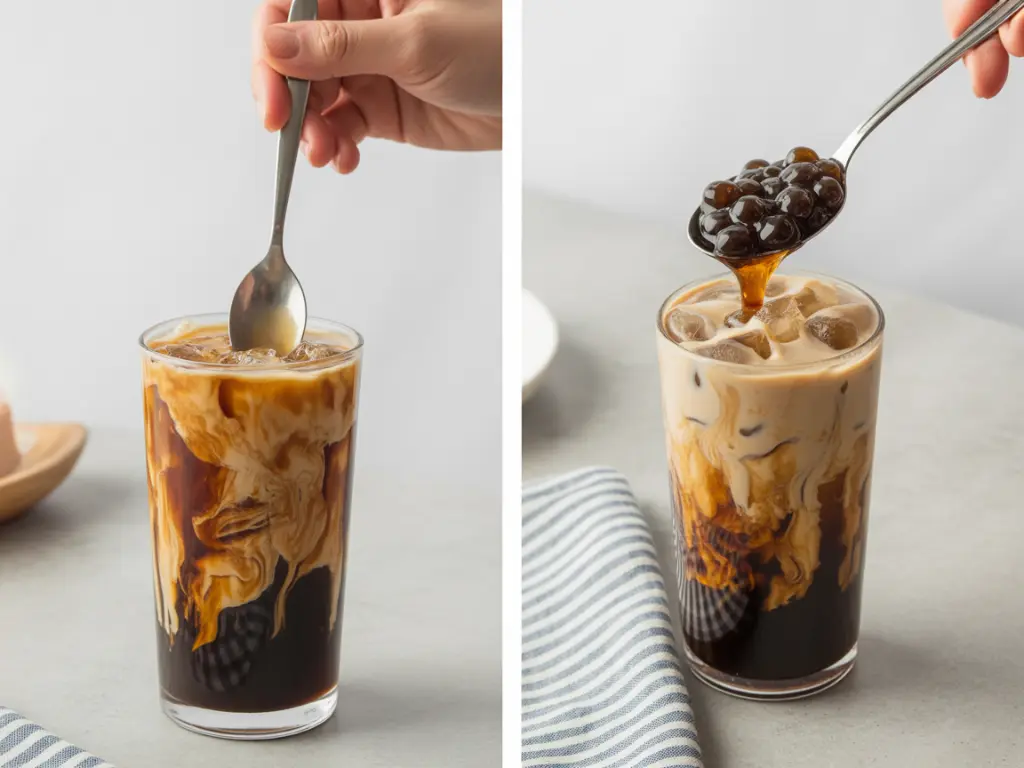
Bubble Pearl Milk Tea
Ingredients
Equipment
Method
- Boil the tapioca pearls according to the package instructions (usually 20–30 minutes). Stir occasionally to avoid sticking.
- Prepare your tea base by steeping the tea bags in hot water for 5–7 minutes. Let it cool.
- Sweeten the tea with brown sugar syrup while it’s warm so it dissolves evenly.
- Assemble your drink by adding cooked pearls to the bottom of a glass, followed by ice cubes.
- Pour in milk, then the cooled tea. Shake or stir well before serving.
Notes
What Is Bubble Pearl Milk Tea?
What Is Pearl Bubble Tea Made Of?
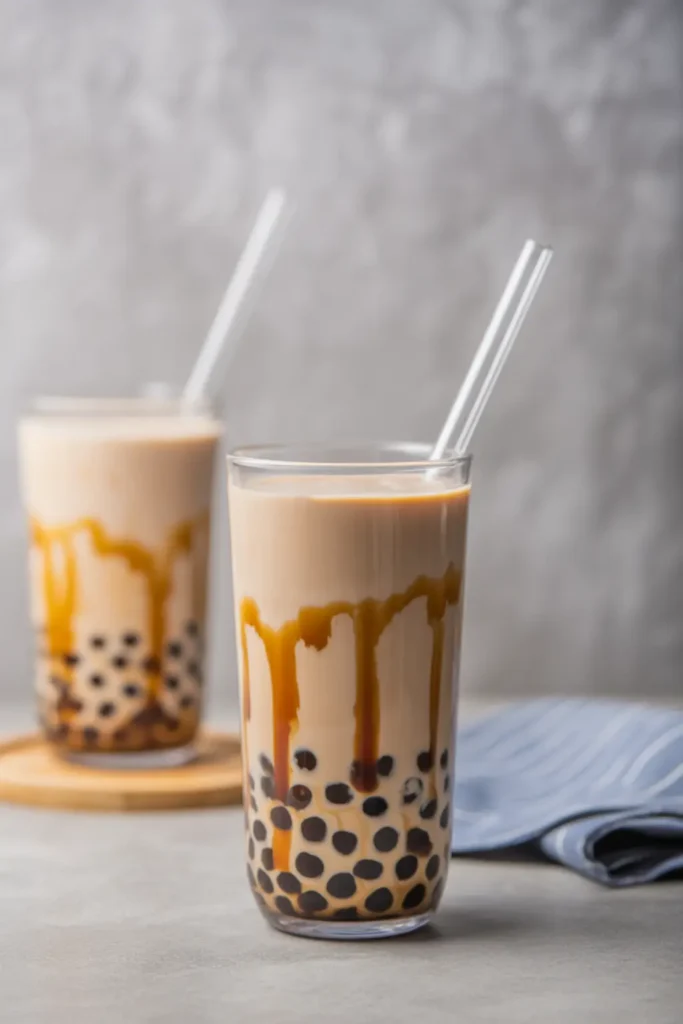
Bubble pearl milk tea is a creamy beverage made with brewed tea, milk (or a dairy-free option), sweetener, and chewy tapioca pearls. These black pearls—often called boba—are made from tapioca starch, which comes from the cassava root. The drink is typically served cold over ice and sipped with an extra-wide straw to accommodate the pearls.
The magic begins with the tea base. Traditionally, strong black tea or green tea gives the drink its depth, while whole milk or oat milk adds richness. Then there’s the sugar syrup, which can be white sugar, brown sugar, or even honey, depending on preference. Finally, the tapioca pearls are boiled until soft and sweetened before being added to the bottom of the cup.
At its core, this drink is all about texture meets flavor. The creamy tea contrasts with the soft bounce of the pearls, making each sip both satisfying and slightly playful.
If you’re curious about how this differs from other similar drinks, check out our Taro Milk Tea guide, where the base is made from root vegetables instead of tea leaves.
The Origins of Bubble Tea
While bubble tea has become a global trend, it actually began in Taiwan during the 1980s. Two separate tea houses claim credit for its invention, both adding tapioca balls to milk tea in creative experiments. Since then, the drink has evolved to include fruit flavors, cheese foams, and even jelly cubes.
Originally called “pearl milk tea” or “boba tea,” the drink got the nickname “bubble tea” from the frothy bubbles created when shaking it in a cocktail-style tumbler—not the pearls themselves.
Over time, this treat has gone from a local favorite to an international craving. Whether it’s enjoyed with brown sugar syrup or topped with whipped cream, its foundation remains unchanged: tea, milk, sweetener, and chewy pearls.
How to Make Bubble Pearl Milk Tea at Home
Ingredients for Homemade Bubble Pearl Milk Tea
Creating bubble pearl milk tea at home is easier than most think. Here’s what you need:
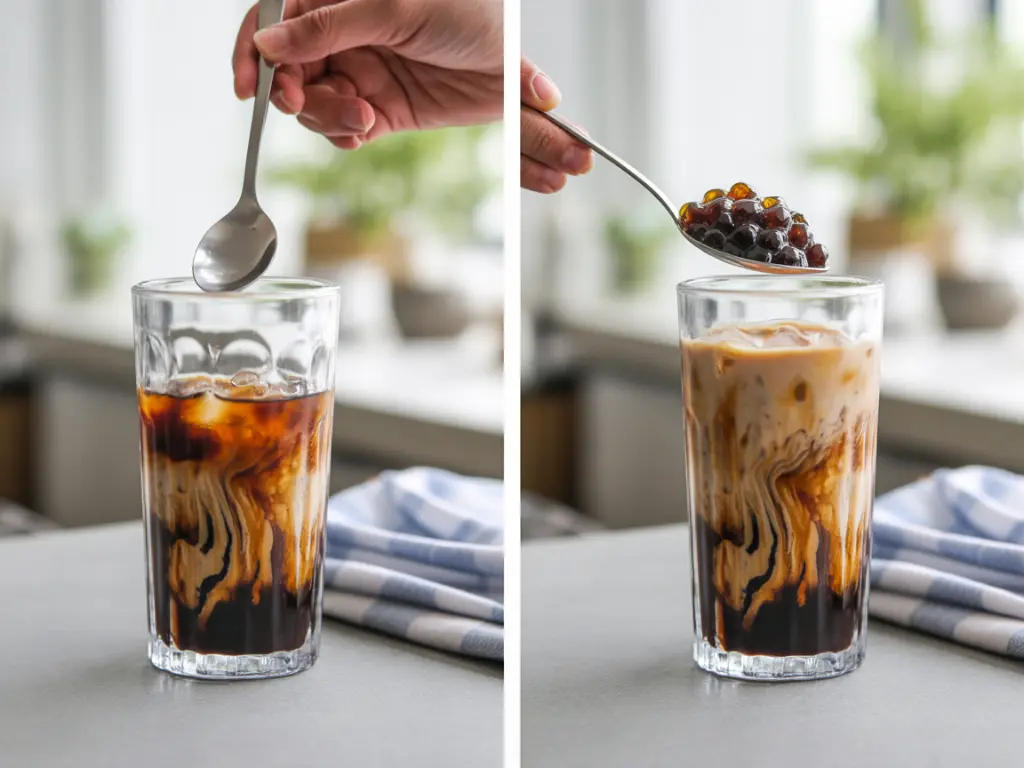
- Black or green tea (loose leaf or tea bags)
- Tapioca pearls (available online or at Asian grocery stores)
- Milk (whole milk, oat milk, or almond milk)
- Sugar or brown sugar syrup
- Ice cubes
Optional ingredients:
- Honey or flavored syrups
- Sweetened condensed milk
- Matcha or taro powder
The star of the recipe is the tapioca pearls. They are what define this drink and give it that signature chew. For a deeper milk tea flavor, use jasmine tea or oolong. You can also swap the milk for coconut or soy if you’re dairy-free.
To explore a similar fruity and refreshing option, see our Mango Iced Tea recipe that blends real mango pulp with fresh tea.
Step-by-Step Instructions
- Boil the tapioca pearls according to the package instructions (usually 20–30 minutes). Stir occasionally to avoid sticking.
- Prepare your tea base by steeping the tea bags in hot water for 5–7 minutes. Let it cool.
- Sweeten the tea with sugar or brown sugar syrup while it’s warm.
- Assemble your drink: Add pearls to the bottom of the glass, pour in ice, then top with milk and tea.
- Shake or stir well before drinking.
You can experiment by adding different toppings like popping boba, fruit jelly, or even salted cheese foam. It’s also possible to batch-make this and store it in the fridge for up to 24 hours.
Looking for a way to make this drink healthier? Try the tips we included in our Healthy Green Smoothie Bowl for Weight Loss post, where balance and natural ingredients are key.
Bubble Pearl Milk Tea Nutrition & Health Questions
Is Bubble Pearl Milk Tea Healthy?
Bubble pearl milk tea is delicious, but not always considered a health drink. A standard 16 oz serving can contain:
| Component | Average Amount |
|---|---|
| Calories | 250–400 kcal |
| Sugar | 30–50g |
| Fat | 5–10g |
| Caffeine | 30–70mg |
Tapioca pearls are made from starch and add chewiness, but also a lot of carbs. That said, bubble tea can be made lighter with less sugar, almond or oat milk, and smaller servings of pearls.
Craving a flavorful drink without the sugar load? Try our apple cinnamon detox water for a naturally sweet and refreshing option.
Are Bubble Pearls Safe to Eat?
Yes, when cooked properly, tapioca pearls are safe to eat and digest. But they are not meant to be eaten raw. They must be boiled until soft and chewy. Once prepared, they should be consumed within a few hours for best texture and safety.
Common questions:
- Are you supposed to chew bubble tea pearls? Yes, always chew them—swallowing whole may cause choking.
- Can kids drink bubble milk tea? Yes, but in moderation, and pearls should be small and soft.
Looking for lighter boba options? Explore our over-night detox drinks that offer a gentler way to enjoy beverages.
Comparing Bubble Pearl Milk Tea to Other Popular Teas
Bubble Pearl Milk Tea vs. Regular Milk Tea
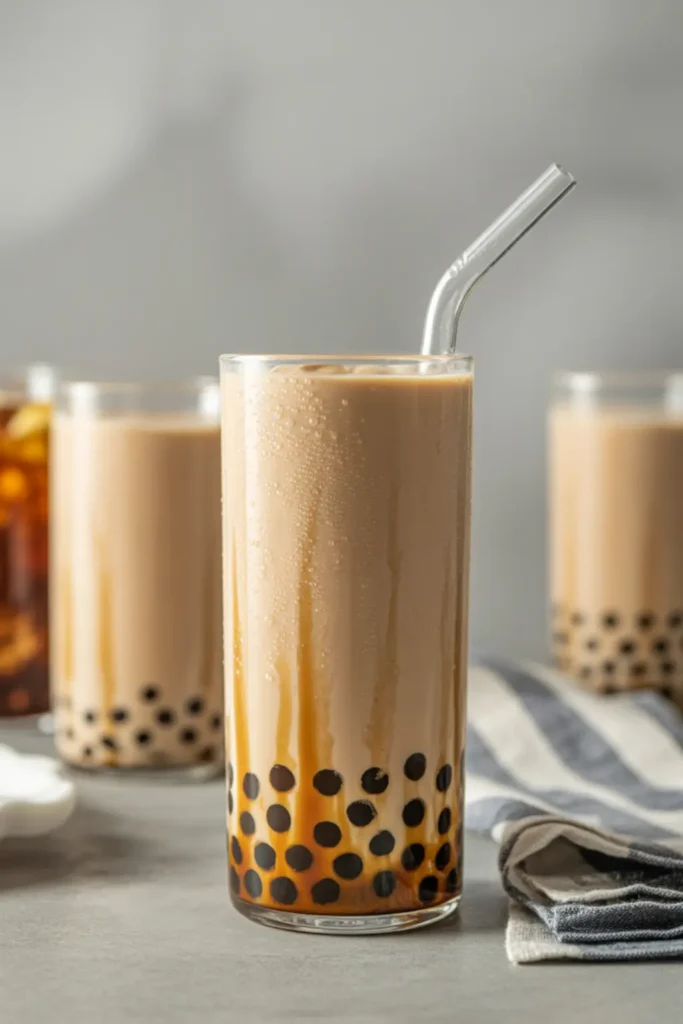
While both bubble pearl milk tea and classic milk tea share a tea base and milk addition, their texture and experience differ significantly:
| Feature | Bubble Pearl Milk Tea | Regular Milk Tea |
|---|---|---|
| Texture | Chewy tapioca pearls | Smooth and creamy |
| Calories | Higher due to pearls | Lower in comparison |
| Sweetness | Usually sweeter | Can vary by type |
| Drinking Style | Sipped and chewed | Sipped only |
Want a milk tea experience without the chewiness? Our iced matcha latte recipe is a refreshing and creamy alternative.
Taro Milk Tea vs. Bubble Pearl Milk Tea
Taro milk tea is another favorite, often confused with bubble pearl milk tea. Here’s how they compare:
- Taro milk tea features taro root for flavor and a purple hue. It may or may not contain tapioca pearls.
- Bubble pearl milk tea emphasizes the texture, thanks to its tapioca pearls.
Taro is naturally starchy and slightly nutty, while bubble pearl milk tea flavors range from fruity to creamy. You can enjoy both—just like we shared in our complete taro milk tea recipe.
Taste, Texture & Flavor Profiles of Bubble Pearl Milk Tea
What Does Bubble Pearl Milk Tea Taste Like?
The signature flavor of bubble pearl milk tea balances sweetness with creaminess. It typically features:
- Strong tea base (usually black, oolong, or jasmine)
- Creamy milk or dairy-free alternatives like almond, oat, or soy
- Chewy tapioca pearls, subtly sweet with brown sugar or honey flavor
Each sip combines the rich smoothness of milk tea with chewy tapioca balls, creating a unique drink-and-snack-in-one experience. Some versions include brown sugar syrup, which adds a caramel-like depth.
Looking for a variation with a fruity touch? You might also love mango iced tea as a bright and tropical option.
Why Is Bubble Tea So Addictive?
The addictive appeal comes from its multi-sensory satisfaction:
- The act of chewing tapioca pearls keeps your mouth busy.
- The sweetness hits a craving spot for sugar.
- The texture creates contrast and novelty.
Many fans say it’s like enjoying dessert in a cup. Whether served hot or cold, the experience is fun and indulgent. Those new to boba can start with milder flavors like vanilla or honeydew. For tea lovers, jasmine or roasted oolong adds depth.
Need a lighter, protein-packed refreshment? Try our healthy green smoothie bowl for weight loss.
How to Make Tapioca Pearls for Bubble Pearl Milk Tea
Homemade Bubble Tea Pearls Recipe (Tapioca Pearl How-To)
Making your own tapioca pearls at home is easier than you might think, and it makes your bubble pearl milk tea even more special. Most store-bought pearls are packed with preservatives, but a homemade version gives you full control over taste and texture.
To prepare your own bubble tea pearls recipe, all you need is:
- Tapioca starch (also called cassava starch)
- Water
- Optional: brown sugar or food-grade purple yam extract for flavor and color
Start by heating a small amount of water and brown sugar until just boiling. Add tapioca starch and stir until a thick paste forms. Let it cool slightly, then knead into a dough. Roll into small balls the size of marbles and coat lightly with starch to prevent sticking. Finally, boil the pearls in water for about 20 minutes, then soak them in a sugar syrup for that signature sweet chewiness.
If you’re looking for a shortcut, there are pre-made tapioca bubble milk tea kits available, but nothing beats the freshness of homemade pearls.
Can You Use White Tapioca Pearls for Bubble Tea?
Yes, but with a few notes. White tapioca pearls, also known as unflavored pearls, are typically used in desserts. They’re firmer and less sweet than black boba pearls made with brown sugar or molasses.
While they technically work in bubble pearl milk tea, most people prefer the darker pearls for their chewy texture and caramelized flavor. However, if you’re watching your sugar intake or aiming for a lighter drink, white tapioca pearls can be a better choice.
| Type of Pearl | Taste & Texture | Best Use |
|---|---|---|
| Black Tapioca Pearls | Sweet, chewy, soft | Classic bubble pearl milk tea |
| White Tapioca Pearls | Neutral, firmer bite | Low-sugar milk teas, desserts |
For more delicious drinks, check out our homemade mango iced tea recipe or try a refreshing pineapple-mint detox water to rotate your beverage routine.
Health Insights of Bubble Pearl Milk Tea
Calories in Pearl Milk Bubble Tea: What to Expect
The calorie content of bubble pearl milk tea varies depending on ingredients and portion size. A regular 16 oz serving with sweetened milk, black tea, and tapioca pearls contains an average of 250 to 400 calories. The tapioca pearls alone contribute 100–150 calories due to their starch and sugar content.
If you’re customizing your drink, here’s a breakdown:
| Ingredient | Calories (Est.) |
|---|---|
| Black Tea (unsweetened) | 0–5 |
| Sweetened Milk | 100–150 |
| Tapioca Pearls (¼ cup) | 120–160 |
| Syrups or Flavorings | 50–100 |
To reduce calories, opt for unsweetened almond milk, ask for less sugar syrup, or use smaller portions of boba. If you’re interested in lower-calorie tea recipes, check out our green apple detox juice or low-calorie banana pancakes.
Is Pearl Boba Chewy or Crunchy? Texture Explained
Pearl boba is best known for its unique chewy texture, often described as soft and bouncy, like mochi. This chewiness comes from the high starch content in tapioca flour, which gelatinizes during boiling. When cooked correctly, the center of each pearl should be slightly firm with a soft exterior.
However, poorly cooked pearls may turn out undercooked (hard) or overcooked (mushy). Always soak them in a warm sugar syrup after boiling to keep them soft and flavorful. And yes—you’re supposed to chew them! Swallowing them whole is not only unsatisfying, but it can also be a choking hazard.
If you love chewy textures, you might also enjoy our mango iced tea or the sweet bite of chia seeds in detox drinks.
Bubble Milk Tea Tips for Beginners & Toppings
Best Bubble Pearl Milk Tea Flavors for First-Time Drinkers
If you’re new to bubble pearl milk tea, you might wonder where to begin. The safest option? Classic milk tea with tapioca pearls. It offers a balance of creamy sweetness and chewy boba without overwhelming flavor complexity.
Here are a few popular beginner-friendly options:
| Flavor | Why It’s Great |
|---|---|
| Taro Milk Tea | Sweet, nutty, and creamy (see our [taro recipe](https://bestyrecipe.com/taro-milk-tea/)) |
| Honeydew Milk Tea | Mild melon flavor and refreshing finish |
| Classic Black Milk Tea | Smooth and familiar, with moderate sweetness |
| Thai Milk Tea | Rich and creamy with a subtle spice |
If you’re sensitive to caffeine, look for fruit-based teas or request decaf options. You can also start with less sugar or half boba if you’re watching calories. Need a caffeine-free option? Visit our mango iced tea post for a great alternative.
Topping Options Beyond Tapioca Pearls
Bubble tea has evolved far beyond just pearls. Here are popular toppings you can add or swap into your bubble pearl milk tea:
- Popping Boba – These pearls burst with juice when bitten (available in mango, lychee, strawberry).
- Crystal Jelly – A low-calorie, chewy option made from konjac.
- Aloe Vera Cubes – Hydrating and lightly sweet.
- Grass Jelly – Earthy flavor and soft texture.
- Cheese Foam – A creamy, slightly salty topping layered over the tea.
You can even mix two toppings, like tapioca pearls + pudding, to make it more satisfying. Just ask your boba barista to customize your combo. Some people love the chewiness of pearls, while others go for fruit jellies for a lighter drink. There’s no wrong answer—only personal taste.
Looking to make it at home? Grab our homemade zepbound drink as a no-caffeine companion.
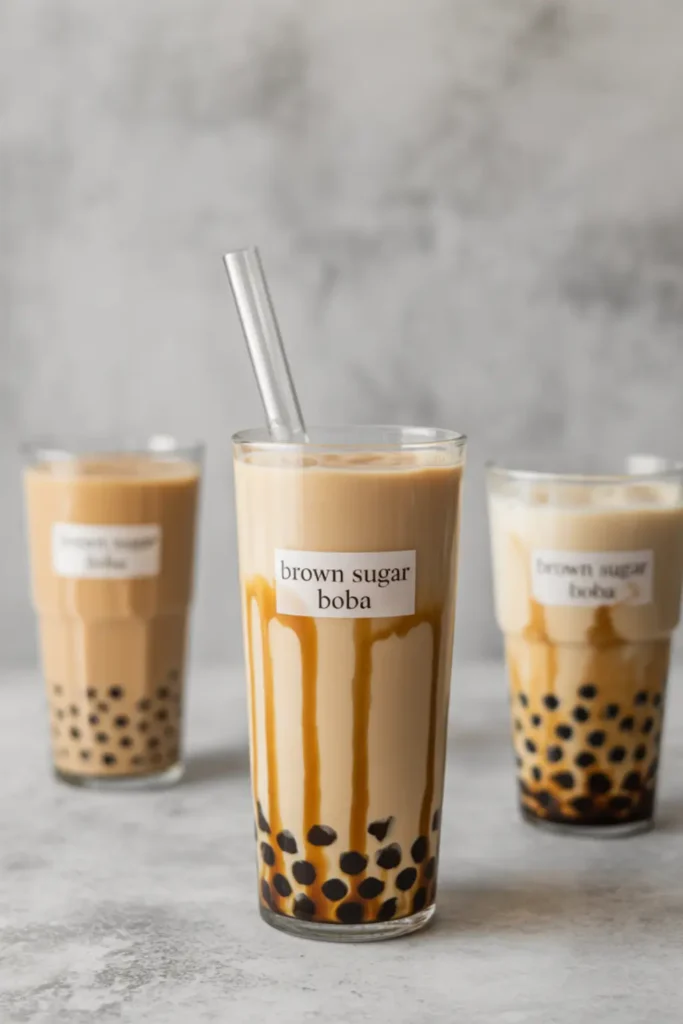
FAQs About Bubble Pearl Milk Tea
What is pearl bubble tea?
Pearl bubble tea (boba tea) is a sweet milk-based drink filled with chewy tapioca balls. The pearls are made from cassava starch, boiled until soft, then sweetened in syrup, and served with a wide straw so you can sip and chew at the same time.
What does pearl milk tea taste like?
Classic versions taste like creamy, sweet black tea. The pearls add a subtle molasses note and a soft, chewy texture. Flavored syrups or fruit purées can change the overall taste.
Is pearl milk tea healthy?
It can be calorie-dense if loaded with sugar and flavored syrups. Make a lighter version by cutting sugar, using unsweetened almond or oat milk, and skipping high-sugar toppings.
Are you supposed to chew the pearls in bubble tea?
Yes. The tapioca pearls are meant to be chewed for texture. If you dislike them, try crystal boba or fruit jelly instead.
What is the difference between boba and bubble tea?
Strictly speaking, “boba” refers to the tapioca pearls, while “bubble tea” is the complete drink. In casual use, both terms often mean the same thing.
Is bubble pearl tea naturally purple?
Only if natural ingredients like taro root or ube are used. Many shops rely on artificial powders and food coloring for the lavender hue.
What are tapioca pearls made of?
They are made from tapioca starch (cassava root). The starch is mixed with hot water, rolled into balls, and boiled until translucent and chewy.
Is it OK to eat raw boba pearls?
No. Raw pearls are hard and inedible. They must be boiled 30–45 minutes to become soft; eating them raw can cause digestive issues and choking hazards.
Why is bubble tea so popular?
It’s customizable, refreshing, and interactive—the chewy pearls plus colorful layers make it fun to drink and visually appealing for social media.
Can Mormons drink bubble tea?
Many members of the Church of Jesus Christ of Latter-day Saints avoid caffeine. Decaf or herbal versions (fruit tea, caffeine-free bases) are acceptable for those following that guideline.
What is the difference between taro and ube?
Taro is starchier with a mild, nutty flavor and turns light purple when cooked. Ube is sweeter, naturally deep violet, and has a stronger dessert-like taste.
Is there caffeine in pearl milk tea?
Yes, if made with black or green tea. Request caffeine-free versions using herbal teas, fruit purées, or a milk-only base.
Conclusion
Bubble pearl milk tea isn’t just a drink—it’s an experience. From the moment the straw hits the cup to that first bite of chewy tapioca, it offers something comforting and playful. Whether you make it from scratch at home with natural ingredients or grab a cup from your favorite spot, the magic lies in the balance: sweet, creamy tea paired with soft pearls that satisfy with every sip.
And now that you know how to make it, customize it, and even tweak it for healthier options, your perfect cup of pearl milk tea is just one brew away. If you loved this, you might also enjoy our taro milk tea recipe or mango iced tea, both easy and refreshing. Happy sipping!
Hungry for more? Discover fresh recipes every day on BestyRecipe’s Pinterest & Facebook!
